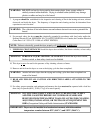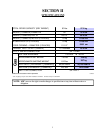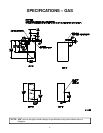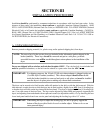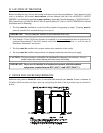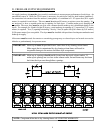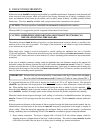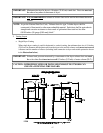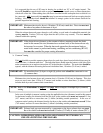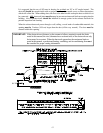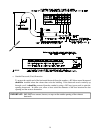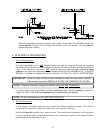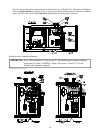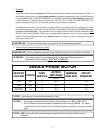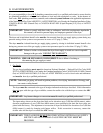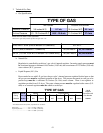
12
It is suggested that the use of 90º turns in ducting be avoided; use 30º or 45º angles instead. The
ductwork should be smooth inside with no projections from sheet metal screws or other obstructions,
which will collect lint. When adding ducts, the duct to be added should overlap the duct to which it is to
be connected. ALL ductwork joints must be taped to prevent moisture and lint from escaping into the
building. Also, inspection doors should be installed at strategic points in the exhaust ductwork for
periodic inspection and cleaning.
IMPORTANT: Minimum duct size for dryer is 10-inches (25.40 cm) round duct. Duct size must not
be reduced anywhere downstream of dryer.
When the exhaust ductwork passes through a wall, ceiling, or roof made of combustible materials, the
opening must be 2-inches (5.08 cm) larger than the duct (all the way around). The duct must be
centered within this opening.
IMPORTANT: If the ductwork run (distance) or the amount of elbows required exceeds the limits
noted in this manual, the size (diameter/cross-sectional area) of the ductwork can only
be increased to an extent. When the ductwork approaches the maximum limits as
noted in this manual, a professional heating, ventilating, and air-conditioning (HVAC)
firm must be consulted for proper venting information.
b. Common Venting
If it is not feasible to provide separate exhaust ducts for each dryer, ducts from individual dryers may be
channeled into a “common main duct.” The individual ducts should enter the bottom or the side of the
main common duct at an angle not more than 45º in the direction of airflow. The main duct should be
tapered, with the diameter increasing before each individual duct, 10-inches (25.40 cm) is added.
IMPORTANT: No more than four (4) dryers or eight (8) pockets total should be connected to one
(1) common duct.
Minimum duct size between dryer and common duct is 10-inches (25.40 cm) in diameter. This duct
must not travel more than 15 feet (4.57 meters) and include no more than three (3) elbows (which
includes both dryer and common duct connections).
NOTE: Refer to the illustrations on page 13 and page 14 for examples of multiple dryer (common)
venting.
In the case of multiple (common) venting, using the applicable duct size (diameter) noted in this manual
for horizontal venting, the distance from the last dryer to the outside outlet must not exceed 15 feet
(4.57 meters) and have no more than one (1) elbow (including outside protection). In the case of
common vertical venting, the distance from the last dryer to the outside outlet must not exceed 25 feet
(7.62 meters) and have no more than three (3) elbows (including outside protection).
IMPORTANT: Exhaust back pressure measured by a manometer at the dryer exhaust duct area must
be no less than 0 and must not exceed 0.3 inches (0.74 mb) of water column (W.C.).
CAUTION: IMPROPERLY SIZED OR INSTALLED EXHAUST DUCTWORK CAN
CREATE A POTENTIAL FIRE HAZARD.



